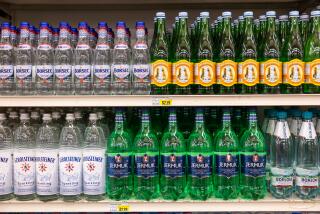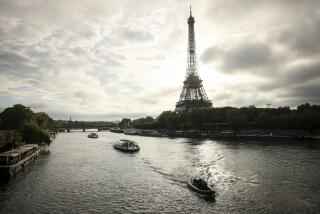Tap Water Around the World Developing a French Flavor
PARIS — Tap water is not a beverage automatically associated with France and its lifestyle. Vintage wines, fine brandies--bottled mineral water perhaps.
The reality of world business, though, is astonishingly different. With their national origins often hidden or largely unknown to the public, two venerable French companies have become the main global players in the treatment and delivery of a substance no human being can live more than a few days without: drinking water.
In locales as varied as Manila, Bethlehem, Berlin and Burbank, these companies are building water systems, selling technical know-how and managing municipal waterworks and sewage treatment plants around the world. And they are making big money doing it. “We’re absolutely present in the whole world--130 countries,” said Thierry Bourbie, deputy general director of Suez Lyonnaise des Eaux, one of the Paris-based water giants.
“We love globalization,” Pierre Servent, communications director for the other company, Vivendi, said with an enthusiasm for the topic rare in France.
Suez Lyonnaise des Eaux estimates that no fewer than 1 billion people worldwide drink water from water purification plants and pumping stations built by its construction subsidiary.
In 1999, Vivendi made a big splash in the American market by buying Palm Desert-based USFilter, the world’s largest supplier of water treatment systems, with $5 billion in annual revenue.
As part of that purchase, Vivendi acquired Culligan, the only nationwide distributor of 5-gallon bottled water. Gratingly familiar to consumers through decades of TV commercials, the Culligan Man was transformed into L’Homme Culligan.
Leaders in France may rail about globalization and the greed and power of U.S. multinationals such as McDonald’s and Coca-Cola, but no Gallic voices of note have been raised to protest the spectacular French success at taking over the water supplies of foreign cities.
And Americans should hear more about these companies in the coming years: Suez Lyonnaise estimates the market for private water companies in the U.S. will expand 20% a year as municipalities increasingly turn the running of local waterworks over to the private sector.
Already, water or waste-water treatment facilities in Atlanta, Boston, Houston, Indianapolis, Milwaukee and Jersey City, N.J., are in the hands of professionals working for the French companies.
Another profitable sideline for the French is what might be called industrial water--selling the filters, chemicals and scientific advice that guarantee the likes of Coca-Cola and Starbucks the same quality of water in Perth Amboy, N.J., as in Paris.
(These companies are not involved in selling the bottles of water that millions of Americans have taken to carrying around. But that’s another segment of the water business where Europeans, such as Nestle of Switzerland and Danone of France, are a leading force.)
For Vivendi, the U.S. has become the biggest market outside France, representing 35% of its water business. In California alone, Suez Lyonnaise, via a New Jersey subsidiary, United Water Resources, runs sewage treatment or water recycling plants in the cities of Avalon, Banning and El Segundo. In Burbank, it manages a water reclamation plant, which purifies waste water so it can be sprinkled on lawns and gardens in public parks.
By 2015, according to a Suez Lyonnaise study, the annual revenue for private water management companies in the U.S. market should reach $40 billion. Vivendi sees the U.S. as the most promising market for at least the next decade.
“We Europeans find the water quality in the United States to be bad,” Servent said. “The networks have gotten old, and to compensate, the water is chlorinated to death. It’s funny to us, but when Americans drink the water in Western Europe and they don’t taste chlorine, they’re worried. For the Americans, if it’s not chlorinated, it’s not healthy. In Europe, it’s the opposite.”
Gold in Those Pipes
Two American professional associations have forecast a need during the next 20 years for $330 billion in new spending on waste-water infrastructure projects in the U.S. alone. These are the kinds of stratospheric numbers that thrill executives at Suez Lyonnaise and Vivendi.
Indisputably, the profit margin is a lot better on a bottle of Cheval Blanc or other fine Bordeaux than on a quart drawn straight from the tap, but there’s more money to be made in water and water treatment. Consider the figures.
Last year, sales of French wine and spirits to the United States totaled $1.2 billion. During the same period, Vivendi did $4.3 billion in water-related business in the U.S., not counting Culligan’s $768-million gross. Of Suez Lyonnaise’s $8-billion total in water-related revenue in 1999, $1.5 billion came from the American market.
In the meantime, these companies used water profits to morph into some of the most diverse conglomerates in the French business world, with ventures in the Internet, cellular telephone service and cable television, among other things. Just last week, Vivendi was reported to have ended takeover talks with Seagram Co.
Both water companies enjoyed double-digit percentage increases in profits last year, as each earned about $1.3 billion. Neither firm will break out earnings from its water business. But Emmanuel Turpin, a research analyst in the London office of investment bank Morgan Stanley & Co., calls the two companies’ growth potential “huge.”
“They have the management, they have the experience, they have what is called a beachhead strategy,” Turpin said. “They get into a country by winning a contract, so they are in a position to win more.”
The water companies’ relationships with France’s highest-ranking politicians is legendary. And competitors grouse that these connections have resulted in outrageously profitable water contracts in France that generate the money the companies use to branch out into telecommunications and other fields.
Because of their size, the French rivals can afford to spend what appear to be unparalleled sums on research and development in the water sector, a total of nearly $200 million last year between them. Not surprisingly, many innovations in the field have been French.
Vivendi has developed a filtering process that can strain particles or microbes out of water that are 1/10,000th the thickness of a human hair, and it has TV cameras that can cruise through mains, checking for leaks. Suez Lyonnaise is experimenting with a state-of-the-art pollutant detector that uses DNA to find any of 300 bacteria or other living contaminants in water.
Americans often lecture the French on the benefits of private enterprise. But when it comes to water, it was the French who began moving into the larger and less densely populated United States, where the expenses involved in building reservoirs, aqueducts and urban distribution networks became the burden of local governments.
Suez Lyonnaise des Eaux’s pedigree dates to the 1858 founding of a company by visionary French engineer Ferdinand de Lesseps to dig and manage the Suez Canal. Generale des Eaux, the corporate ancestor of Vivendi, created by imperial decree of Napoleon III in 1853, won the concessions to supply Paris and Lyons, and later Venice and Constantinople (now Istanbul), with drinking water.
Another critical juncture for the companies came after the liberation of France from the Nazis. A 1945 decree established state-run electricity and natural gas companies for all of France. Suez Lyonnaise and Generale des Eaux were stripped of their assets in nationalized sectors but were paid compensation they chose to plow back into the core business left to them: water.
“We can therefore say that France has the two largest water groups because it nationalized electricity,” Gerard Mestrallet, chairman and chief executive of Suez Lyonnaise, has observed.
The U.S., in the meantime, was evolving into a highly fractured market where 55,000 cities, towns and other municipal units built their own waterworks and waste-water treatment systems. In 88% of the cases, according to one French study, the local government runs the operations itself.
A January 1997 ruling by the Internal Revenue Service further changed the water game, according to U.S. municipal officials. Before, a city might lose the tax-exempt status of its bonds if it put the waterworks under private management. The ruling protected the exemption.
Moreover, the Environmental Protection Agency has become more demanding about drinking-water standards, insisting contaminants be reduced to parts per trillion instead of parts per thousand or million.
“Everybody needs larger and larger amounts of capital to meet the new stringent standards,” said Larry Wallace, chief operating officer for the city of Atlanta. “And the way these things work, if we can save $20 million a year, we can borrow a billion.”
To get that kind of efficiency, Atlanta shopped in the private sector. Last year, Suez Lyonnaise subsidiary United Water began a 20-year contract to supply 1.5 million people in Georgia’s capital with drinking water. The company is now in charge of operating two treatment plants and a 2,400-mile labyrinth of mains and pipes. It reads meters, collects payments from customers and handles employees’ pension funds.
In private hands, according to Wallace, the cost of slaking Atlantans’ thirst has plummeted, from $49.5 million to $29.4 million a year. “Bottom line, we save at least $20 million a year,” Wallace said. Half of the savings, he said, goes to Suez Lyonnaise--another way the French make money from water.
“When we first got involved abroad, our competitors laughed like crazy,” Suez Lyonnaise’s Bourbie recalled with a grin. “ ‘There’s no market,’ they said.”
Third World Potential
In fact, the two French companies’ figures show the market has never been thirstier. Suez Lyonnaise calculates that by 2015 more than $1 trillion will have to be invested in water systems throughout the world. Even now, an estimated 1.2 billion people do not have access to clean drinking water. It’s a tragedy--but also an opportunity.
Thus Vivendi recently signed a 30-year contract to manage the water and sewer systems in Almaty, Kazakhstan, a city of 1.2 million and a launching pad in the potentially vast market of the former Soviet Union.
“We calculate that by 2005, another 300 million people in the world will be served by the private sector,” Bourbie said. “The market out there is enormous.”
And it is one where the French remain well poised to take advantage of opportunities.
Third World markets often demand improvisation. In La Paz, Bolivia, the French companies have enlisted the support of priests in poor parishes to remind churchgoers to pay their water bills. In the crime-ridden slums of Buenos Aires, to keep the pipes running, representatives of Suez Lyonnaise admit to entering into pacts with neighborhood crime bosses.
“You have to work with the local structures that exist,” Bourbie said. “If you’re not protected, you can’t enter these places; they’re no-man’s lands.”
The risks involved when foreigners deal in such a vital commodity as water were highlighted this month when peasants armed with machetes and clubs staged an uprising in the high Andes valleys of central Bolivia.
The cause? A plan by a consortium led by International Water Ltd. of Britain, one of the French companies’ rivals, to privatize the water system and raise rates.
Six people died, a state of siege was proclaimed and the government resigned in the country’s worst unrest since 1982.
(BEGIN TEXT OF INFOBOX / INFOGRAPHIC)
Water Works
Two French water companies have become the main players in water systems throughout the world, including right here in Southern California:
Vivendi
* Founded: As Generale des Eaux in 1853 to irrigate French farmland and supply water to towns; investors included the Rothschild family and Napoleon III’s half-brother.
* Headquarters: Paris
* Employees: 235,610
* 1999 revenue: $37.9 billion
* 1999 net income: $1.3 billion
* Business areas: Utilities, communications, construction.
Vivendi became the world’s largest water company in 1999 when it bought Palm Desert-based USFilter.
It operates water services in the
Asia-Pacific region, Latin America and Britain as well as the United States. Through USFilter, it owns Culligan and will provide swimming pool water for the 2000 Summer Olympics in Australia. It also has plans for agricultural water reclamation in the Imperial Valley.
*
Suez Lyonnaise des Eaux
* Founded: Formed in 1997 by the merger of Suez Canal builder Compagnie de Suez, founded in 1858, and water and engineering giant Societe Lyonnaise des Eaux et de l’Eclairage, founded in 1880.
* Headquarters: Paris
* Employees: 201,000
* 1999 revenue: $28.6 billion
* 1999 net income: $1.3 billion
* Business areas: Utilities, communications, construction.
Suez Lyonnaise operates private infrastructure services in more than 120 countries. It is the world’s second-largest water company. In 1999, Suez Lyonnaise bought water treatment company Calgon. Through its stake in New Jersey-based United Water Resources, it operates local sewage treatment or water recycling and reclamation plants in Avalon, Banning, El Segundo and Burbank.
Sources: Company Web sites; Hoover’s company profiles; Bloomberg News; Times research
Researched by NONA YATES/Los Angeles Times
More to Read
Sign up for Essential California
The most important California stories and recommendations in your inbox every morning.
You may occasionally receive promotional content from the Los Angeles Times.










